8 top tips to lose weight, according to science
These proven secrets to slimming down are backed by real research.
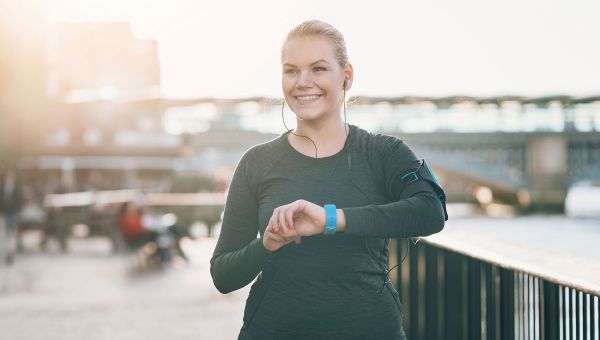
In theory, losing weight is simple: burn more calories than you consume. But, anyone who’s tried to slim down can tell you, it’s harder than it sounds. And commercial diets, ever-evolving recommendations and conflicting information don't help.
Fortunately, science has your back. Reliable research and thorough studies have established some concrete facts about slimming down.
We spoke with Eric Krebill, MD, a specialist in bariatric and general surgery with Mercy Health Saint Mary’s in Grand Rapids, Michigan, who revealed some of the best research-backed weight loss secrets, and ways you can give them a try for yourself.
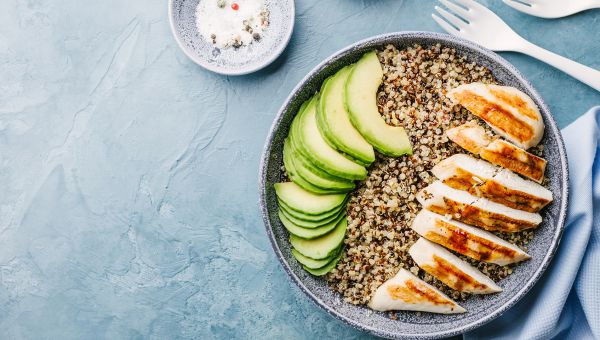
Say "no" to elimination diets
In a world of low-fat, low-carb and high-protein diets, it can be tough to determine the best way to lose weight. According to Krebill, diets like Atkins don’t promote long-term weight loss. Instead, he recommends eating a healthy balance of fruits, veggies, healthy fats, whole grains and proteins.
He’s not the only one. The Centers for Disease Control and Prevention suggest elimination diets limit your nutritional intake and aren’t usually successful for weight loss in the long run. Instead of banning food groups from your diet, make better choices:
- Load half your plate with non-starchy veggies, like broccoli and asparagus.
- Add a three-ounce serving of lean protein, like chicken or salmon, to your meal.
- Pile on a half-cup serving of whole grains, like brown rice or quinoa.
- Sweeten your meal with low-sugar fruits, like berries.
- Enjoy moderate amounts of healthy fats, like olive oil and avocado.

Keep a food journal
“Weight loss itself really comes down to simple math—calories in versus calories out,” says Krebill. To lose weight, you must be in a calorie deficit, meaning you're burning off more calories than you're consuming. An old rule of thumb: dropping one pound means torching about 3,500 calories. To do this in a week, you would consume 500 fewer calories a day—or burn that much during exercise.
Keeping track of your calories—in and out—can be harder than you think. Krebill has a solution: “We strongly advocate for food journaling, so patients can really understand what they're putting in their bodies."
Research supports that recommendation. Results from a 2008 study of 1,700 people suggest those who kept a food diary lost twice as much weight as those who didn’t. Start your own food journal by taking handwritten notes on the foods you eat throughout the day, or download an app, like Sharecare, to help you keep track. Sharecare is available for iOS and Android and allows you to log the size and quality of your meals; just open the app and keep track.
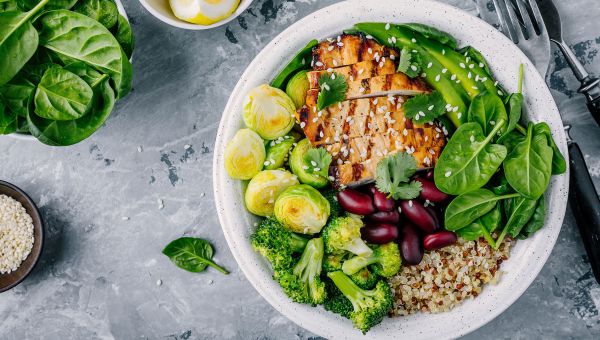
Eat whole foods
When you’re goal is to feel healthier, you may be inclined to reach for the low-fat, low-carb or reduced-calorie options in your supermarket. These may not be best, since typical “weight loss” options often contain additives, like artificial sweeteners. Instead, reach for whole foods, like fruits, veggies, lean protein and whole grains, which research suggests are best for weight loss.
When compared to refined grains like white rice and pasta, less-refined whole grains like quinoa and brown rice digest more slowly, keeping you fuller, longer. This makes whole grains better for dropping pounds.
Despite its caloric load, a moderate portion of nuts also helps with weight management. Research suggests noshing can sate hunger and help you eat less. Just keep it to one serving—24 almonds, 14 walnut halves or 28 peanuts.

Move more throughout the day
Diet is the main driver of actually losing weight, but exercise is important in keeping pounds off for the long-term. “If you attempt to lose weight strictly by diet alone, without incorporating exercise, you're typically not going to be successful,” says Krebill. “It really is a total package—you have to be committed to both,” he adds.
A 2014 systemic review that included eight studies and more than 1,000 participants supports this. Researchers found, over a 12-month period, diet and exercise were more effective for weight loss and maintenance than either diet or exercise alone.
There are easy ways to incorporate exercise into your daily routine without spending hours at the gym. Krebill recommends getting the most movement out of the activities you enjoy. That way, being active becomes less of a chore.
In 30 minutes, a 155-pound person can burn:
- 198 calories dancing
- 162 calories doing yard work
- 144 calories stretching
- 216 calories swimming
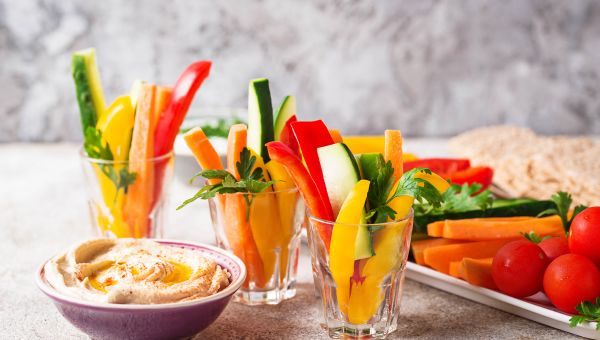
Plan healthy snacks
No one wants to feel hungry. Healthy, well-planned snacks can keep you satisfied and help you lose weight. “It's my opinion that eating when you’re hungry and when we know you should be getting those calories is important,” says Krebill, who recommends his patients eat between four and six smaller meals throughout the day.
Snacking between meals can help sate hunger and prevent binging at your next meal. In fact, some research suggests people who eat more than three times per day actually weigh less than those who don’t. Mid-afternoon bites may also boost energy and give you the push you need to power through a workout.
Research on just how much meal frequency affects weight is conflicting, however, and snacking throughout the day may not be for everyone. If all-day eating is too much effort or you find yourself reaching for unhealthy snacks, stick to eating fewer meals a day.
One thing’s for sure: if you’re looking to slim down, meals, regardless of how frequently you eat them, should be moderately low in calories. Don’t blow your calorie goals by gorging at every meal. Diet-friendly snacks should be around 100 calories, contain fiber, protein and carbohydrates and be free of added sugar, salt and unhealthy fat.
Healthy snack options include:
- 2 tablespoons of hummus and 1 cup of carrots
- Fruit smoothie with 1 cup of berries and 1/2 cup nonfat milk
- 1 small apple and low-fat string cheese

Drink more water
If you’re looking to slim down, H2O may be just what your body needs. We get some hydration from the foods we eat, but drinking water is the best way to replenish the fluid we lose throughout the day. The exact amount of water your body needs depends on gender, activity level, climate and overall health, but most people need a minimum of 64 ounces of water daily according to Krebill.
One 2011 systemic review found that those who drank a sugar-sweetened beverage, like soda, before a meal consumed more calories than those who drank water. There’s a possible explanation: Calories from beverages—like the 140 calories in a 12-ounce can of cola—tend to be less satisfying than those from foods. Even after you’ve guzzled a glass of your favorite drink, you'll likely still consume a full meal.
It’s also common to mistake a feeling of thirst for that of hunger, which makes us eat when we’re not actually hungry. Some, but not all, research suggests water actually fills your stomach, causing you to eat less at your next feeding. If you’re looking to slim down, before you reach for your next meal, pour yourself a glass of water.
For some, like those with kidney or heart problems, it’s possible to get too much water. Speak with your doctor about how much water you should drink each day.
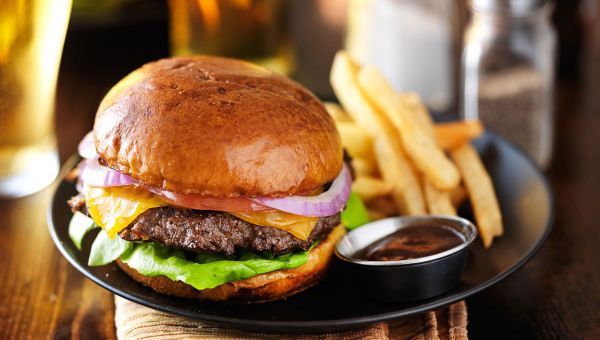
Enjoy a cheat meal
You might not have to sacrifice your favorite foods to shed a few pounds. In fact, depriving yourself of your favorite treats may lead to unhealthy binges when cravings become overwhelming.
Instead, eat the unhealthy stuff in moderation. Research suggests the occasional cheat meal may make for a more enjoyable weight loss journey. Results from a 2016 study of 36 individuals published in the Journal of Consumer Psychology suggests participants who ate a lower number of calories six days a week and splurged on the seventh were happier and more motivated than those who ate the same moderate number of calories for seven days, despite little difference in actual weight loss between the groups.

Talk to your doctor
Age, medication and health conditions can influence your ability to slim down.
- After about age 30, lean tissue is gradually replaced by fat, making weight loss more difficult.
- Certain prescription drugs, like beta-blockers and antidepressants, can alter your metabolism, change the way your body absorbs nutrients and increase your appetite.
- Diseases like polycystic ovary syndrome, a disorder that causes an imbalance of hormones, can make shedding pounds harder.
- Too much stress and too little sleep can boost your cravings for unhealthy eats.
Sometimes, diet and exercise aren’t enough to counter these factors. If you’re struggling to lose weight, talk to your doctor about treatment for your conditions, new medication or even weight loss surgery. Surgery isn’t for everyone, but it may be a good option for those with obesity and obesity-related conditions—like type 2 diabetes or heart disease—who haven’t had success with diet and exercise. Results from several studies suggest, when compared with non-surgical weight loss treatments and therapies, bariatric surgery is more effective at reducing body weight and increasing the rate of remission for obese individuals with diabetes and metabolic syndrome. Some newer research shows that bariatric surgery can improve the management of diabetes in morbidly obese individuals, with some even experiencing cessation of the condition altogether.
There is no quick fix or miracle diet for weight loss, but these science-backed tips can help put you on the right track. A healthy diet, regular physical activity and advice from your healthcare provider are key components to slimming down.

U.S. Department of Agriculture. “Protein foods.” Accessed July 1, 2021.
Densie Webb. “Farewell to the 3,500-Calorie Rule.” Today’s Dietitian. November 2014.
Hollis JF, Gullion CM, Stevens VJ, et. al. “Weight Loss Maintenance Trial Research Group. Weight loss during the intensive intervention phase of the weight-loss maintenance trial.” American Journal of Preventative Medicine. August 2008.
Harvard T.H. Chan School of Public Health. “Whole Grains.” Accessed July 1, 2021.
Harvard Health. “Eating a daily serving of nuts linked with lower risk of heart disease.” February 1, 2018.
Johns, D. J., Hartmann-Boyce, J., Jebb, S. A., Aveyard, P., & Behavioural Weight Management Review Group. “Diet or exercise interventions vs combined behavioral weight management programs: a systematic review and meta-analysis of direct comparisons.” Journal of the Academy of Nutrition and Dietetics. October 2014.
Harvard Health. “Calories burned in 30 minutes for people of three different weights.” March 8, 2021.
Mayo Clinic. “Water: How much should you drink every day?” October 14, 2020.
Weed, D. L., Althuis, M. D., & Mink, P. J. (2011). “Quality of reviews on sugar-sweetened beverages and health outcomes: a systematic review.” The American Journal of Clinical Nutrition. November 2011.
Olga Khazan. “The Glory of the Cheat Day.” The Atlantic. April 20, 2016.
MedlinePlus. “Aging changes in body shape.” July 19, 2020.
Roslin MS, Cripps CN. “Bariatric surgery in managing diabetes mellitus.” Current Opinion in Gastroenterology. November 2016.
Rita Coelho, Valea Rik Pieters, Marcel Zeelenberg. “The benefits of behaving badly on occasion: Successful regulation by planned hedonic deviations.” Journal of Consumer Psychology. January 2016.
More On


video

article

slideshow


video


video
